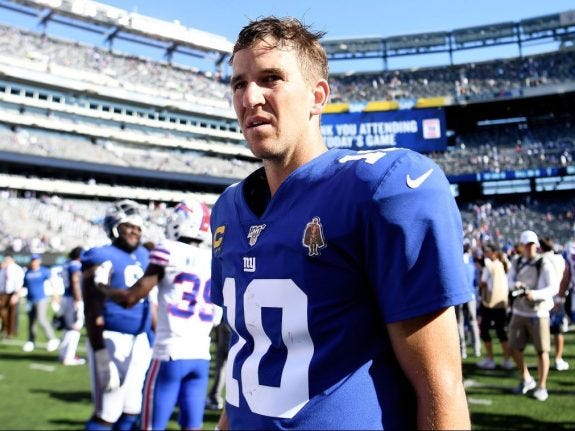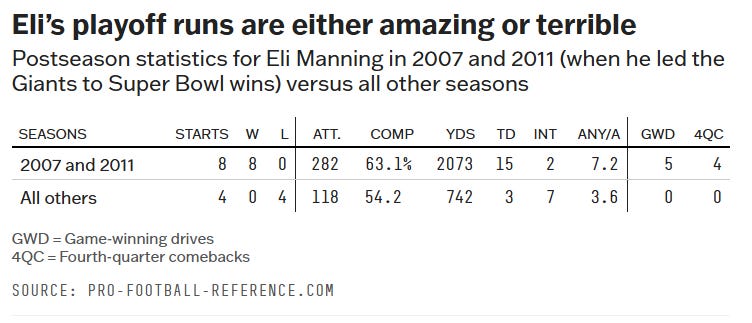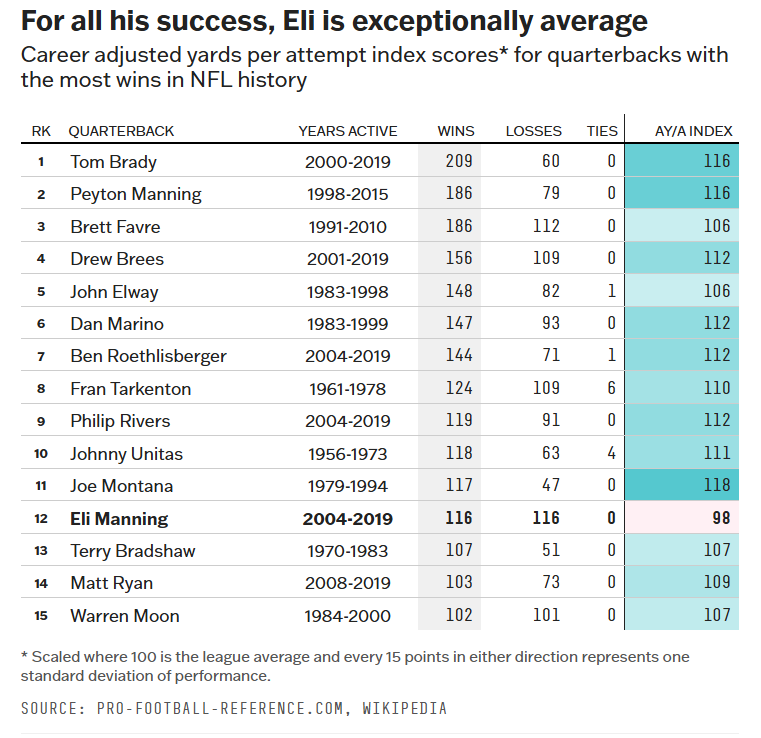Eli Manning Was An All-Time Average QB

The end of Eli Manning’s stint as starting quarterback for the New York Giants appears to be at hand. The team announced Tuesday that it was moving on from its longtime fixture under center, naming rookie Daniel Jones as starter going forward. With that, one of the greatest — and weirdest — runs that any iconic franchise leader ever had is coming to an end.
As we’ve detailed before, the youngest Manning brother has been a very average quarterback over the course of his NFL career. In fact, according to Pro-Football-Reference.com’s advanced passing index, he is one of the most average QBs ever, checking in with a lifetime adjusted net yards per attempt (ANY/A) index of 101 (where 100 is dead-average for the era). Manning’s durability has managed to keep him in the lineup longer than most other passers — more on that later — but on a rate basis, there hasn’t been much special about Manning’s career passing efficiency numbers.
The way Eli got to average, however, was anything but. Among qualified QBs since the merger, Manning is the only one to grade out as average or better by ANY/A while simultaneously rating below average in completion percentage, yards per attempt and interception percentage. He pulled off that feat by being better than average at throwing for touchdowns — and he’s had plenty of memorable TD strikes over the years — while ranking as one of the best in history at avoiding sacks (something else that shows up in his signature moments). Unlike his brother Peyton, who became an all-time legend by excelling in basically the same categories as other great QBs did, Eli did it his own way, as always.
And then there are the epic highs and ignoble lows of Manning’s tenure in New York. Although his yearly efficiency marks have — somewhat surprisingly — not bounced around too much more than those of his peers, Manning has compounded his regular-season performances with playoff numbers that have been all over the place. When he was leading the Giants to a pair of Super Bowl victories after the 2007 and 2011 seasons, Manning went a perfect (by definition) 8-0 with a passer rating (100.1) nearly 7 points higher than he ever had in any single regular season of his career. In all of his other postseason appearances combined, he went 0-4 with a rating (61.8) about 8 points worse than any regular season he’d had after his rookie campaign.
For such an average quarterback, Manning became a much more extreme version of himself in the playoffs — which worked wonders twice and failed badly on four other occasions. Now, you might expect most Super Bowl-winning QBs to have such a split; after all, the team is also much more likely to win when its starting QB plays better. But even relative to other multi-time Super Bowl winners, Manning stands out. None of them were worse by quarterback rating in their non-Super Bowl winning playoff runs, and only Troy Aikman had a bigger split in QB ratings between years when he won the Super Bowl and years when he didn’t.
There’s also Manning’s penchant for staying in the lineup week in and week out. Manning is tied for 23rd in NFL history in games started (at any position) and had the second-longest consecutive QB starts streak ever going until 2017, when former N.Y. coach Ben McAdoo bungled literally everything about the Giants’ season. Manning is — once again — so different from his peers on the quarterback durability list.
He’s 12th in all-time QB wins, just ahead of four-time Super Bowl winner Terry Bradshaw, and right behind four-time winner Joe Montana. Among the top 10 in wins, every QB had a career passing index1 of at least 106; all but two (Brett Favre and John Elway) have an index of at least 110. Bradshaw and Montana also crack 106. But then there’s Eli, at 98, the winningest truly average QB in pro football history. (Or the most average winning QB ever, depending on how you look at it.) Manning might stand out as mediocre among that group of legends — but you still have to give him credit for being in the group in the first place.
Add it all up, and Eli — the super-average QB, the mega-durable starter, the multi-time champion — has had one of the most interesting career arcs of any quarterback ever, if not any athlete, period. I went looking for other players in the NBA or MLB2 who ranked among the top 50 in all-time career value (Manning was 36th in lifetime Approximate Value going into 2019) who also were basically average on a rate basis and won multiple championships:
Among the Top 50 in NBA Win Shares, Elvin Hayes was closest to average on a per-minute basis, and he also led the 1978 champion Washington Bullets in WS, though that was the only title he won.
In baseball, Pete Rose is probably the most average hitter to crack the Top 50 in Baseball-Reference.com’s wins above replacement, and he won three World Series (including being named MVP in 1975). Rose, however, had a career OPS+ of 118, so he was better at hitting than Manning has been at efficient passing.
Among pitchers, Tommy John was the most average in the WAR Top 50, but he never won a title. Going down the list, the closest Eli analogue might be Don Drysdale, who won three World Series with the Dodgers from 1959 to 1965. Like Rose, though, Drysdale might have been too good: His career ERA+ was 121, which was also a fair amount better relative to average than Manning has been at QB.
The difficulty in finding exact comparables for Manning from other sports underscores how singular his career has been in its ups, downs and, in the end, its average-ness. I shouldn’t talk about Eli’s career in the past tense, of course. He’s 38 years old, but this is an era when top QBs play well into their forties. There even remains some chance that Jones falters (or is injured) and Manning is reinstalled as starter by season’s end — though once teams hand the keys to a young starter, they don’t tend to reverse course on that decision.
Ironically, after years of Manning being worse than the perception of him, his numbers last season weren’t as terrible as they might have seemed. His ANY/A index of 101 matched his career average exactly. But this year, that number has dropped to 93. Though he is still 23rd in our starting QB rankings, ahead of such QBs as Derek Carr and Andy Dalton, his 62.3 quarterback rating in Sunday’s loss to Buffalo was apparently too much for New York coach Pat Shurmur to bear.
Once beloved by fans at the Meadowlands, Manning has largely seen Giant backers turn on him, or at least pity him, even if they’ll always appreciate the pair of Super Bowls he helped bring to the franchise. Such is the nature of the what-have-you-done-for-me-lately NFL. But while it lasted, there was no denying that Manning’s run with the Giants was one of the strangest, most impressive (and simultaneously unimpressive) careers we’ve seen in sports.
Filed under: NFL
Using regular adjusted yards per attempt (instead of adjusted net YPA) so that we can compare with passers whose careers began before sacks were first tracked in 1969.
I would also have included the NHL, but there isn’t a great rate statistic for historical hockey players.







